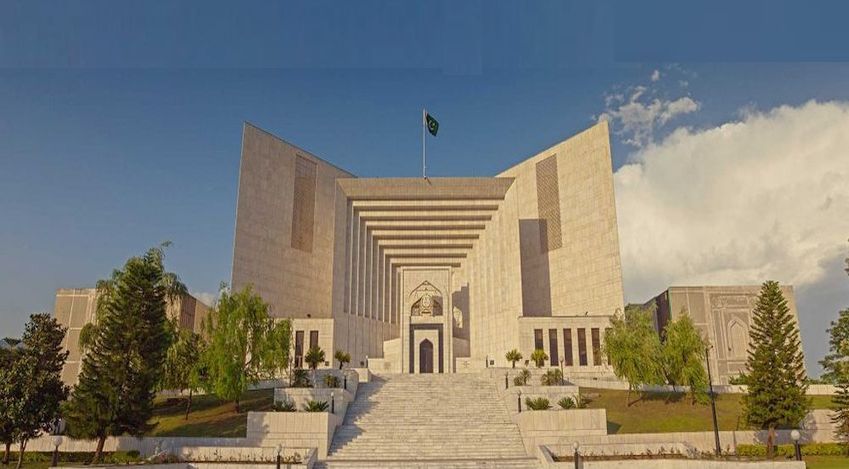All Future Constitutional Interpretation Cases will be heard exclusively by Constitutional Benches --- Supreme Court of Pakistan Declares Regular Bench’s Orders Null and Void
Islamabad 10-02-2025: In a landmark ruling, the Supreme Court of Pakistan’s Constitutional Bench has recalled the orders dated January 13 and January 16, 2025, passed by a Regular Bench, declaring them without jurisdiction. The Court reaffirmed that only Constitutional Benches can adjudicate cases involving the interpretation of constitutional provisions, as per the 26th Constitutional Amendment, 2024.
The case originated from [CP No. D-4658/2018], filed by Dewan Motors (Pvt.) Ltd. and others in the Sindh High Court, challenging the vires of Section 221-A(2) of the Customs Act, 1969, inserted via the Finance Act, 2018. The petitioners argued that the amendment sought to retrospectively validate regulatory duties imposed without constitutional authority.
On August 3, 2020, the Sindh High Court Division Bench, comprising Mr. Justice Aqeel Ahmed Abbasi and Mr. Justice Abdul Maalik Gaddi, ruled that the amendment was ultra vires to the Constitution of Pakistan. The ruling was based on precedents such as Premier Systems (Pvt.) Ltd. Vs. Federation of Pakistan (2018 PTD 861) and Mustafa Impex Vs. Government of Pakistan (PLD 2016 SC 808), which emphasized that taxation powers could not be delegated without cabinet approval.
The Federal Board of Revenue (FBR) and Revenue Division challenged the Sindh High Court ruling through multiple [Civil Petitions Nos. 836-K to 887-K/2020, 741-K to 743-K/2021, and 165-K of 2022] in the Supreme Court of Pakistan.
Initially, these Civil Petitions were heard by Regular Benches of the Supreme Court of Pakistan:
- May 6, 2021: A three-member bench issued notices to the Attorney General for Pakistan to address whether Section 221-A(2) of the Customs Act was constitutionally valid.
- February 7, 2023: A different bench heard arguments on whether the Finance Act, 2018’s validation clause could cure a constitutional defect. The government cited Molasses Trading & Export (Pvt.) Ltd. Vs. Federation of Pakistan (1993 SCMR 1905) and Khurshid Soap and Chemical Industries Vs. Federation of Pakistan (PLD 2020 SC 641) in defense of the amendment.
However, with the enactment of the 26th Constitutional Amendment in 2024, which introduced Article 191A, a jurisdictional challenge emerged. The amendment created Constitutional Benches with exclusive jurisdiction over cases involving constitutional interpretation. This meant that the Regular Bench could no longer hear the matter.
On January 13 and January 16, 2025, the Regular Bench, comprising Mr. Justice Syed Mansoor Ali Shah, Ms. Justice Ayesha A. Malik, and Mr. Justice Irfan Saadat Khan, heard the petitions and raised jurisdictional concerns regarding Article 191A.
However, the Constitutional Bench later recalled these orders, stating that the Regular Bench lacked jurisdiction under the amended constitutional framework.
The Court ruled that:
- Article 191A mandates that only Constitutional Benches can exercise original jurisdiction (Article 184), appellate jurisdiction (Article 185(3)), and advisory jurisdiction (Article 186).
- The Regular Bench’s orders were coram non judice (i.e., made without jurisdiction) and therefore null and void.
- Misallocation of cases does not confer jurisdiction, and administrative errors must be corrected by the Registrar’s office.
The Constitutional Bench reinforced several legal doctrines in its judgment:
- Legislation cannot validate unconstitutional acts retrospectively without proper constitutional amendments.
- A decision made by a Court without jurisdiction is void ab initio.
- A Court ruling made in ignorance of the Constitution holds no legal weight.
- If the foundation of an order is void, all subsequent orders based on it collapse.
Cited Case Laws:
- Mr. Justice Qazi Faez Isa Vs. President of Pakistan (PLD 2022 SC 119)
- Mian Irfan Bashir Vs. Deputy Commissioner (D.C.), Lahore (PLD 2021 SC 571)
- Sabir Shah Vs. Shad Muhammad Khan (PLD 1995 SC 66)
- Marbury Vs. Madison (5 US 137 [1803])
This ruling sets a major precedent for the Supreme Court of Pakistan internal jurisdictional framework:
- All future constitutional interpretation cases will be heard exclusively by Constitutional Benches.
- The ruling emphasizes that Regular Benches must refrain from entertaining constitutional matters.
- The judgment reinforces the principle of judicial restraint, preventing judges from assuming legislative or executive functions.
Additionally, the Registrar’s office has been directed to implement better case management to prevent future jurisdictional misallocations.
The Supreme Court of Pakistan Constitutional Bench has firmly asserted its exclusive authority under Article 191A, marking a significant milestone in Pakistan’s judicial history. The ruling clarifies the limits of Regular Benches and upholds the separation of powers, ensuring constitutional matters are handled strictly within the designated framework.
Powered by Froala Editor








